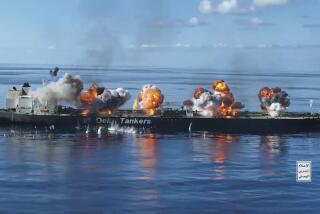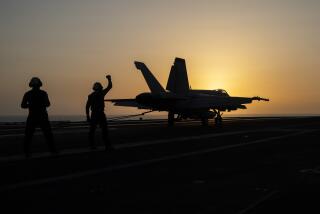Pirates show range and daring
BEIRUT AND NAIROBI, KENYA — In their most brazen raid yet, suspected Somali pirates operating deep in open waters have seized an oil tanker as long as an aircraft carrier, the U.S. military in the Middle East said Monday.
So audacious and unusual was the Indian Ocean attack that it caught the attention of America’s top military official, who expressed shock at the pirates’ ability to strike so far from shore.
“I’m stunned by the range of it,” said Navy Adm. Michael G. Mullen, chairman of the U.S. Joint Chiefs of Staff, commenting at a Pentagon news conference Monday. “Four hundred fifty [nautical] miles away from the coast, that is the furthest, the longest distance I’ve seen for any of these incidents.”
The Liberian-flagged Sirius Star, one in a class of ships that stretch longer than three football fields and can carry 2 million barrels of oil, is also the largest vessel yet to be attacked by pirates, said Navy Lt. Nathan Christensen of the U.S. 5th Fleet.
The attack appeared to mark an escalation by Somali pirates in response to a recent international crackdown. After the capture of a weapons-laden Ukrainian vessel in September, the U.S., the European Union and Russia all sent warships to patrol the dangerous waters and confront pirates. The Ukrainian ship and its crew are still being held off the coast of the East African country as its owners negotiate with the pirates, who are seeking a multimillion-dollar ransom.
Pirates typically attack within 200 miles of shore and go after much smaller prey, Christensen said. But in the case of the oil tanker, the assailants, who are holding hostage a multinational crew of 25, appear to be “fundamentally changing the way they’re doing business,” he said.
The Sirius Star, built in South Korea and owned by Saudi Aramco, had apparently been heading south toward the Cape of Good Hope, around Africa’s southern tip, en route to North America, when it was raided Saturday.
On Monday, it appeared to be on its way to Somalia. The pirates issued no immediate demands, Christensen said by phone from Manama, Bahrain, where the 5th Fleet is based.
The raid did little to roil the depressed oil market, but it did raise major security concerns.
About five years ago, pirates seized the Dewi Madrim, a chemical tanker passing through the Strait of Malacca between Indonesia and Malaysia, but stayed on board only briefly after seizing the technical manuals. Security specialists are concerned that pirates might someday seize a tanker carrying pressurized liquefied natural gas, or LNG, then blow it up or sell it to terrorists.
“If it was an LNG tanker seized, we’re looking at something potentially catastrophic,” said Candyce Kelshall, a specialist in maritime energy security at Blue Water Defence, a Trinidad-based firm that provides training to governments and companies combating piracy. “An LNG tanker going up is like 50 Hiroshimas.”
Mullen said he was not surprised that pirates were able to capture such a massive vessel, because they are often so lightly manned.
The Sirius Star’s crew of 25, consisting of citizens of Britain, Poland, Croatia, Saudi Arabia and the Philippines, was actually double the size of that manning some supertankers.
Shipping firms under pressure to maximize profits often staff the huge high-tech tankers with as few as 12 sailors. They frequently get around maritime regulations by designating the cook as the security officer after a brief training course, security specialist Kelshall said.
Military officials did not say how they believed the pirates managed to overwhelm the crew. Andrew Mwangura, head of the East African Seafarers Assistance Program in Nairobi, the Kenyan capital, speculated that the assailants must have been highly organized and used numerous vessels.
A mother ship probably would have launched two or more smaller craft, perhaps high-speed inflatable rafts with four to six gunmen in each, said Cyrus Mody, manager of the London-based International Maritime Bureau, in a telephone interview.
After the boats reach their target, pirates armed with assault rifles typically throw ladders with hooks onto the ship rails, making a bee-line for the bridge to take control of the vessel’s nerve center and the engine room.
“Once they have actually gained access there’s really very little that the crew could actually do to try to protect themselves,” Mody said.
Piracy is yet another challenge to the already formidable tasks faced by incoming U.S. Central Command chief Army Gen. David H. Petraeus in a region stretching from the Horn of Africa to Central Asia and including wars in Iraq and Afghanistan and the battle against Al Qaeda militants.
“As is evident with the attack on Sirius Star, increasingly daring attacks are being conducted by Somali pirates on a variety of merchant vessels,” the 5th Fleet statement said.
World oil markets took only brief notice of the hijacking, jumping to $58.98 per barrel before closing at $54.95, down $2.09 from Friday, on the New York Mercantile Exchange.
Had the hijacking taken place earlier in the year, before the world’s leading economies began reeling and international demand for oil fell, it might have kicked the price of oil up $5 or more, analysts said.
“Now, there is so much spare oil capacity out there that the markets barely responded,” said Phil Flynn, senior market analyst for Alaron Trading Corp. in Chicago.
The U.S. and allied nations set up a joint security patrol in response to the hijackings off Somalia; the Navy says it has reduced the rate of successful piracy attacks from 53% in August to 31% in October. Last week, a British warship fended off an attack on a Danish commercial vessel, with officers boarding the pirates’ ship and exchanging gunfire that resulted in the deaths of at least two attackers.
“Our presence in the region is helping deter and disrupt criminal attacks off the Somali coast, but the situation with the Sirius Star clearly indicates the pirates’ ability to adapt their tactics and methods of attack,” said U.S. Vice Adm. Bill Gortney, commander of the Combined Maritime Forces.
Somali government officials, who have limited resources, said piracy off their coast requires an international response because it threatens busy trade routes along Africa’s coast and the Gulf of Aden. But some criticized the current international effort as short-sighted because it bypasses Somalia’s U.N.-recognized transitional government.
Gortney said military forces could not be everywhere at once and urged commercial shippers to employ “self-protection measures,” including hiring private security contractors. In the last 15 piracy attacks, at least 10 vessels failed to employ some sort of defensive mechanism, the Navy said.
“Companies don’t think twice about using security guards to protect their valuable facilities ashore,” the naval commander was quoted as saying. “Protecting valuable ships and their crews at sea is no different.”
Ironically, the same technology that allows the safe and efficient operation of such large vessels is also what makes them relatively easy to hijack, experts said.
Modern supertankers rely mostly on computers and GPS satellite navigation rather than the expertise of sailors. That means pirates have fewer people to capture and guard, and the ships can be steered safely by one or two people.
Though it might be dangerous to fire off weapons on a tanker filled with oil or natural gas, a well-staffed security detail can defend a ship with water cannons and other tools.
“People aren’t sufficiently aware of the dangers they’re dealing with,” Kelshall said. “In a post-9/11 world, we need to be thinking a lot more strategically.”
--
edmund.sanders@latimes.com
Times staff writers Peter Spiegel in Washington and Ronald D. White in Los Angeles contributed to this report.
--
Borzou Daraghi reporting from Beirut
Edmund Sanders reporting from Nairobi, Kenya
More to Read
Sign up for Essential California
The most important California stories and recommendations in your inbox every morning.
You may occasionally receive promotional content from the Los Angeles Times.










